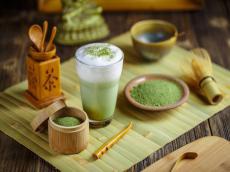|
|
TODAY.AZ / World news
Abnormal Japan heat may cause global matcha shortage
05 July 2025 [09:00] - TODAY.AZ

Japan's ongoing heatwaves have significantly reduced this year's production of matcha green tea, leading to supply shortages and price hikes to historic highs, according to Japanese farmers and industry officials, Azernews reports.
Kyoto Prefecture, responsible for about a quarter of Japan’s tencha production—the dried tea leaves that are ground into matcha—was hit especially hard. The extreme heat during Japan’s hottest year on record caused significant crop damage, resulting in poor harvests in April and May.
Farmer Masahiro Yoshida, who typically produces around two tons of tencha annually, harvested only 1.5 tons this year. “Last summer was so hot it scorched the bushes. We simply couldn’t collect as many tea leaves,” he said.
The timing couldn't be worse. Global demand for matcha has surged in recent years, driven by Millennials and Gen Z consumers embracing health-conscious lifestyles. Trendy cafes worldwide now offer matcha-based lattes, smoothies, and desserts. On social media, matcha content frequently goes viral—boosting its popularity as both a superfood and an aesthetic drink.
Finely ground matcha is prized for its high antioxidant content and higher caffeine levels compared to traditional green tea. But the recent spike in demand has led some wholesalers to implement purchase restrictions to manage limited supply.
According to Japan’s Ministry of Agriculture, Forestry and Fisheries, green tea exports, including matcha, rose by 25% in value to reach 36.4 billion yen ($252 million) in 2024. Export volume also grew by 16%, largely due to the popularity of powdered teas like matcha.
In response, Japanese tea producers are working to expand production. However, industry experts warn that matcha shortages are likely to persist, as it takes about five years for newly planted tea bushes to mature enough for harvesting.
Meanwhile, matcha enthusiasts around the globe may need to brace for higher prices—or seek out alternative sources, such as Taiwan or China, where matcha-style green tea is also produced, though purists argue the flavor and quality are distinctively different from Japanese matcha.
URL: http://www.today.az/news/regions/260423.html
 Print version
Print version
Connect with us. Get latest news and updates.
See Also
- 04 September 2025 [14:33]
BTA head re-elected as Secretary General of Association of Balkan News Agencies – Southeast Europe - 04 September 2025 [11:23]
US delegation to discuss “Trump Route” (Zangazur Corridor) project in Armenia - 04 September 2025 [09:00]
UK bans energy drink sales to under-16s - 04 September 2025 [08:00]
China invent washing machine for astronauts - 03 September 2025 [23:23]
Official movie release based on Call of Duty game - 03 September 2025 [22:26]
American brands losing appeal overseas - 03 September 2025 [21:49]
Shell declines to develop biofuel facility in Rotterdam - 03 September 2025 [21:22]
Hyundai Mobis unveils mobility innovations in Germany - 03 September 2025 [08:00]
Smartphone prices rise globally due to new processors - 02 September 2025 [22:50]
Scientists find GPT-4o Mini vulnerable to psychological effects
Most Popular
 India has failed Armenia and the "Shanghai Spirit"
India has failed Armenia and the "Shanghai Spirit"
 Armenia ceases to be invisible - thanks to Azerbaijan
Armenia ceases to be invisible - thanks to Azerbaijan
 5th round of Brazil-Azerbaijan political consultations held
5th round of Brazil-Azerbaijan political consultations held
 Azerbaijan, Brazil hold inaugural meeting of Working Group on Trade and Investment
Azerbaijan, Brazil hold inaugural meeting of Working Group on Trade and Investment
 Lithuania renews debate over four-day workweek
Lithuania renews debate over four-day workweek
 Baku predict fate of Minsk Group back in 2020
Baku predict fate of Minsk Group back in 2020
 President Ilham Aliyev meets China National Chemical Engineering in Tianjin
President Ilham Aliyev meets China National Chemical Engineering in Tianjin
